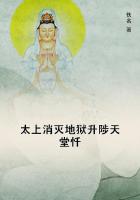Now celibacy had been regarded as the supernal virtue from the time of Saint Jerome. It was supposed to be a state most favorable to Christian perfection; it animated the existence of the most noted saints. Says Jerome, "Take axe in hand and hew down the sterile tree of marriage." This notion of the superior virtue of virginity was one of the fruits of those Eastern theogonies which were engrafted on the early Church, growing out of the Oriental idea of the inalienable evil of matter. It was one of the fundamental principles of monasticism; and monasticism, wherever born--whether in India or the Syrian deserts--was one of the established institutions of the Church. It was indorsed by Benedict as well as by Basil; it had taken possession of the minds of the Gothic nations more firmly even than of the Eastern. The East never saw such monasteries as those which covered Italy, France, Germany, and England; they were more needed among the feudal robbers of Europe than in the effeminate monarchies of Asia. Moreover it was in monasteries that the popes had ever found their strongest adherents, their most zealous supporters. Without the aid of convents the papal empire might have crumbled. Monasticism and the papacy were strongly allied; one supported the other. So efficient were monastic institutions in advocating the idea of a theocracy, as upheld by the popes, that they were exempted from episcopal authority. An abbot was as powerful and independent as a bishop.
But to make the Papacy supreme it was necessary to call in the aid of the secular priests likewise. Unmarried priests, being more like monks, were more efficient supporters of the papal throne. To maintain celibacy, therefore, was always in accordance with papal policy.
But Nature had gradually asserted its claims over tradition and authority. The clergy, especially in France and Germany, were setting at defiance the edicts of popes and councils. The glory of celibacy was in an eclipse.
No one comprehended the necessity of celibacy, among the clergy, more clearly than Hildebrand,--himself a monk by education and sympathy. He looked upon married life, with all its hallowed beauty, as a profanation for a priest. In his eyes the clergy were married only to the Church. "Domestic affections suited ill with the duties of a theocratic ministry." Anything which diverted the labors of the clergy from the Church seemed to him an outrage and a degeneracy. How could they reach the state of beatific existence if they were to listen to the prattle of children, or be engrossed with the joys of conjugal or parental love? So he assembled a council, and caused it to pass canons to the effect that married priests should not perform any clerical office; that the people should not even be present at Mass celebrated by them; that all who had wives--or concubines, as he called them--should put them away;and that no one should be ordained who did not promise to remain unmarried during his whole life.
Of course there was a violent opposition. A great outcry was raised, especially in Germany. The whole body of the secular priests exclaimed against the proceeding. At Mentz they threatened the life of the archbishop, who attempted to enforce the decree.
At Paris a numerous synod was assembled, in which it was voted that Gregory ought not here to be obeyed. But Gregory was stronger than his rebellious clergy,--stronger than the instincts of human nature, stronger than the united voice of reason and Scripture. He fell back on the majestic power of prevailing ideas, on the ascetic element of the early Church, on the traditions of monastic life.
He was supported by more than a hundred thousand monks, by the superstitions of primitive ages, by the example of saints and martyrs, by his own elevated rank, by the allegiance due to him as head of the Church. Excommunications were hurled, like thunderbolts, into remotest hamlets, and the murmurs of indignant Christendom were silenced by the awful denunciations of God's supposed vicegerent. The clergy succumbed before such a terrible spiritual force. The fear of hell--the great idea by which the priests themselves controlled their flocks--was more potent than any temporal good. What priest in that age would dare resist his spiritual monarch on almost any point, and especially when disobedience was supposed to entail the burnings of a physical hell forever and ever? So celibacy was re-established as a law of the Christian Church at the bidding of that far-seeing genius who had devised the means of spiritual despotism. That law--so gloomy, so unnatural, so fraught with evil--has never been repealed; it still rules the Catholic priesthood of Europe and America. Nor will it be repealed so long as the ideas of the Middle Ages have more force than enlightened reason. It is an abominable law, but who can doubt its efficacy in cementing the power of the popes?
But simony, or the sale of eeclesiastical benefices, was a still more alarming evil to the mind of Gregory. It was the great scandal of the Church and age. Here we honor the Pope for striving to remove it. And yet its abolition was no easy thing. He came in contact with the selfishness of barons and kings. He found it an easier matter to take away the wives of priests than the purses of princes. Priests who had vowed obedience might consent to the repudiation of their wives, but would great temporal robbers part with their spoils? The sale of benefices was one great source of royal and baronial revenues. Bishoprics, once conferred for wisdom and piety, had become prizes for the rapacious and ambitious.
Bishops and abbots were most frequently chosen from the ranks of the great. Powerful Sees were the gifts of kings to their favorites or families, or were bought by the wealthy; so that worldly or incapable men were made overseers of the Church of Christ. The clergy were in danger of being hopelessly secularized.















